
Homemade Meals for Busy Families
Mary Beth Lagerborg, co-creator of Once-A-Month-Cooking, discusses the importance of hospitality and how families can prioritize dinner time by cooking a month’s worth of healthy meals in one session.
Rescue 2x the babies from abortion!
Home » Episodes » Focus on the Family Broadcast » Forgiveness and Healing for Post-Abortive Women
Woman #1: I made the most awful decision because other people wanted me to. I wasn’t strong enough to do the right thing.
Woman #2: The second it was over I wanted to turn back time, but I can’t. And I feel completely empty and ashamed.
Woman #3: My husband and I have struggled with trauma of our abortion for 34 years.
Woman #4: I think about my baby often. Every year at the anniversary of my due date, I think about how old my child would have been.
John Fuller: Today on Focus on the Family we’re going to be exploring how abortion impacts women, often in unexpected ways. And as we get into this topic, it won’t be appropriate for younger listeners. I’m John Fuller. And your host is Focus on the Family president, Jim Daly.
Jim Daly: Uh, John, those comments are heartbreaking that we just heard, because abortion is clearly not a simple fix or procedure that people describe. Teen girls and women who are looking for a way out of an unplanned pregnancy don’t realize the devastating consequences when they sacrifice the life of their child. It sounds heavy, it is heavy. Abortion damages everything – your health, your emotions, and your identity. And it will impact your marriage and the relationships you have with your future children. And worse, it can damage your relationship with God. That sounds very negative, but God is also there with forgiveness. And that’s the, uh, core of the program today. And I want people to know right from the start that that’s our aim, that’s our passion, to know that in Christ there is forgiveness. If you’ve experienced an abortion in your past, we do want to help you. We have great, caring, Christian counselors that are here for you. I’m grateful to the donor community that supply the resources to take care of that. Uh, simply call us and we will get back to you with a counselor if that’s what you need now.
John: Mm-hmm. Yeah, we have a lot of great resources and support here for you. And our number is 800, the letter A and the word FAMILY. You can also find help at focusonthefamily.com/broadcast.
Jim: Our guests today work on the front-lines of pro-life ministry. They represent the pregnancy resource centers, uh, that are scattered throughout the United States and Canada, which help women who are dealing with unplanned pregnancies. Um, many provide counseling for those who’ve experienced an abortion as well, so you can turn to your local pregnancy resource center for that help, too. Here at Focus on the Family, uh, we partner with the centers through our Option Ultrasound program where we, uh, provide grants to get, uh, ultrasound equipment in and training for that equipment, uh, doctor’s licenses to help cover a clinic. Um, all kinds of things that we attempt to help the clinics with. Let me just say and make a pitch for supporting your local pregnancy resource center. Uh, that’s one of the best things you can do to express your Christian concern and love in a local way. And I’m sure, uh, there’s a pregnancy resource center near you that you can get involved with.
John: And our guests today are Laurie Haynes and Lindsay Christensen. Um, and Laurie is the Director of Post-Abortion Support at the Living Alternatives Pregnancy Resource Center, uh, based in Central Illinois. Lindsay is the COO of the Parkridge Pregnancy Medical Clinic in Lubbock, Texas. And as a professional counselor, she directs the Post-Abortion Recovery program at Parkridge.
Jim: Lindsay and Laurie, uh, welcome to Focus on the Family.
Mrs. Laurie Haynes: It’s great to be here, thank you.
Jim: Good to have you.
Mrs. Lindsay Christensen: Yes.
Jim: Um, let’s start by describing the women you see in your counseling. Um, there’s no typical woman, the average woman who is contemplating abortion. So, give us a portrait of what’s happening. I’m sure it’s teens and even 20-, 30-something women.
Lindsay: Yes. So, while there doesn’t seem to be a typical woman who seeks post-abortion recovery, generally what we have seen in the women that we’ve counseled through the years, um, fall into a couple of different categories. One may be, they’re maybe six months to a year to three years out from their abortion and their life is continuing to implode in some ways. And so, they remember that they came to Parkridge, or they came to a clinic for help and they remember somebody saying, “Hey, if you make this choice, if you have an abortion, um, we want to help you if you struggle.” And so, they may return for some counseling. Another woman that often comes to seek healing may be in her 40s, 50s, or 60s. Maybe her children are older or she’s an empty-nester. And I think in a certain stage of life, uh, women may feel like, “Wow, I have some time to think about me.” And then some of these things are rising to the surface.
Jim: Yeah.
Lindsay: And I’ve seen women, uh, be so courageous. Because how easy would it be for that woman to say, “It’s been 20, 30, 40 years…”
Jim: Yeah.
Lindsay: “…Why would I even go back there?” Yet, I have seen God do amazing work and amazing healing with that woman who has the courage to face that choice, even if it was decades ago.
Jim: What do they say to you in that regard? Why is that spark there to come back? Is it, is it, again, grieving that loss? I mean, they raise their other two, three, four kids and yet there was that other.
Lindsay: Oftentimes, the women coming to us in that age range have heard about us at their church. So, they hear about a ministry, like Parkridge or Living Alternatives, and they hear that there’s an option for post-abortion recovery. I’ve had women say, “I had no idea there was a place that I could go just to talk about that.” They don’t feel like they can talk about it in their regular Bible studies, or book clubs, or community groups. For some reason, the enemy continues to make them believe that it’s not safe. So, when they can find a place that specializes and is safe, they often realize, “I need to go.”
Jim: That’s good.
Laurie: Can I just add onto that? I think now, too, with abortion in the media and in the news, a lot of these wounds are – are coming to the surface. And we pray that these wounds would come to the surface so that people could get help. But I think another thing, when women and men get older, they’re starting to think about generations. And they’re starting to think, “Remember, I could be a grandparent had I not aborted that child. I could be a great-grandparent.” And so, it’s always there.
Jim: Laurie, you have spoken pretty boldly about your situation, that you had an abortion. Um, describe that and, you know, work us through the feelings of that. So, it’s that, you know, statement that your passion was born out of your pain, obviously. And that you’ve given your life to this now.
Laurie: Yes.
Jim: Um, describe why?
Laurie: Yes. Um, well first of all, um, I have to say, it brings me no greater joy than to share my story because God can redeem anything. In my work with post-abortion, I know that many, many women that have this in their past have a history of trauma – um, emotional, physical, sexual trauma. And that’s why I have such a heart for women and even for Christians who – who may not even want to acknowledge it, but they hold a judgment in their heart towards women who made this choice because there can be so much trauma. For me, however, there was not trauma in my life. I was raised in a God-honoring home with two committed, devoted parents. Was raised to know God. Uh, went to church faithfully every Sunday and I had high expectations with how my life was going to go and I did believe in abstinence until marriage. Got to college and got into the party scene, was drinking a lot on the weekends. And one thing led to another, and my boyfriend and I began a sexual relationship. Um, I thought I was doing the, um, responsible thing. I visited a local Planned Parenthood and got on birth control, but a couple months before I was to graduate from nursing school, I discovered I was pregnant. Now, that’s where the quandary is (laughs), because I had this moral, um, sense in me that abortion is wrong. I mean, I knew. I knew it was wrong, but I was scared. I, um, was ashamed. I didn’t want to bring disappointment onto my family. Although my mom and dad – uh, they’re both with the Lord now – they would’ve supported me through that. They would have. Um, a friend of mine had had her abortion six months before. I knew who to call. She gave me the number of a clinic in Chicago. My boyfriend, to his credit, he did offer to marry me at the time, but that was not in my plans. I wanted things to go my way. So, that day, worst day of my life in that clinic. What strikes me now is when I, when I left that clinic, I was relieved. I had that sense of relief like, “Okay. I can get back to my…”
Jim: The problem’s taken care of.
Laurie: The problem’s gone.
Jim: Yeah.
Laurie: I mean, that’s the whole lie behind the abortion industry. It’s a quick fix.
Jim: Yeah.
Laurie: But it’s a lot of times impossible to tell how you’re going to feel…
Jim: Yeah.
Laurie: …On the backend.
Jim: Let me, um – you know, in some ways I hesitate to even ask this question, but oftentimes those on the other side of this debate are going to say, “You know, if the culture was just more accepting of this, if religious people would keep their faith to themselves, then women would not be stigmatized like they are.” I get the question, but I – I think it totally misses what’s in the very deepest part of a woman’s heart. What God has placed in them as a mother. And it starts when you – when you’re pregnant.
Laurie: That’s right.
Jim: You begin to realize there’s something in here that’s a miracle.
Laurie: That’s right.
Jim: It’s spectacular. It’s – this is amazing! And I – you know, all the religious people in the world could keep their mouth shut it’s not going to change what’s in a woman’s heart if she’s honest with herself. Have you experienced that, or have I articulated it right? Or correct me where I’m wrong.
Lindsay: Yeah. I think you articulated that well, Jim, because the women that I’ve had the opportunity to work with and who I’ve heard their stories, regardless of what others have said, or what they see on Facebook, or in politics, they have their own set of values. Um, and really, that’s what determines if somebody is going to struggle afterwards, is what do they value about life? What do they value? Um, and so, it doesn’t really matter in some ways what the culture says, or what Christians say, um, I think women do have – and it’s God’s design. We know that as believers, it’s God’s design from the very beginning…
Jim: Yeah.
Lindsay: …To bond with that child.
Jim: It – it’s so true. And you’re working against God’s nature in that way. And I say that very implicitly, you know, that God has put this in your heart as a woman.
Laurie: I’m so glad you brought that up, Jim, too, because I’m involved – um, I’m on a private Facebook page. It’s called “I Regret My Abortion.” And I am surprised – well, really, not surprised. But I – I read on there from women who regret this choice, okay? And they’re asking for help and they say, “Is there any post-abortion help that I can get that isn’t religious?” And to me, I really, I – I want to say, “You know what? I really can’t recommend a healing program that isn’t based on God, because the bottom line is the sanctity of human life, you feel badly because in your deepest sense, your conscious, you know that that was a life.”
John: This is Focus on the Family with Jim Daly and our guests today are Lindsay Christensen and Laurie Haynes. And, uh, we have resources for you if this reverberating within you. We have counseling, uh, staff that can, uh, talk to you over the phone. We have articles, videos, and more all at focusonthefamily.com/broadcast. Or call 800, the letter A and the word FAMILY.
Jim: Lindsay, let me ask you to describe the counseling process that you use with post-abortive women. Uh, what are some of the key components of that? You’re speaking to women right now that may have never expressed their regret for an abortion that they had. They’ve never talked about it with anybody or maybe just a handful of people.
Lindsay: Hm. Well, I’ll start by telling a quick story. Um, so, a woman I’ve been able to work with, Lauren, um, she came to Parkridge and she sought out healing because she felt like no matter what she did, she could not reconcile her choice of abortion. So, she had felt like she chose that and now her life was going pretty well. She was married. She had a daughter. She was involved in her church. And so, she’s thinking, “Why does this still bother me? I know it was the wrong choice, but it had to be the right choice because look where I am now.” And so, in her mind she had reconciled that surely this must’ve been a good choice, um, because now I have what I always dreamed I would have.
But, every time she would hear the word “abortion,” every time she would even hear positive, um, teaching about that from her church, the shame would well up in her, so she .- I believe women a lot of times, something will click and they’ll identify – they’ll make a connection that the shame and guilt that they feel hasn’t gone away. Like you said, Laurie, there’s so many things that try to cover it up, even good things. Um, women living great lives, abundant lives. Yet, there’s something inside of them that just won’t, um, let them fully live in color…
Jim: Yeah.
Lindsay: …So to speak.
Jim: You know, one time somebody expressed to me – I think I may have been a teenager at the time – but they said, “You know, the Lord’s going to start house cleaning in your heart and you’ve got to give Him access to those small closets.”
Lindsay: Yes.
Jim: And it – it seems to me, as I look at this issue, um, women and men too that go through it, can compartmentalize it, this into that small closet. “Lord, check out the bedroom, certainly clean my heart. The living room’s wide open to you. Oh, but don’t open this door.” And you’re also kind of describing the lack of grieving. You know, that we have to cover it up to the point that we don’t properly grieve the loss or the decision that we made. Speak to that issue of grieving in that process.
Laurie: That is very poignant to me, uh, personally, because, um, after having my abortion, that was in 1983, I met the Lord Jesus in 1988 and oh my goodness. In my religious background, I will say it was more of an intellectual belief, kind of, a ritualistic belief. It wasn’t…
Jim: Huh.
Laurie: … It wasn’t a personal relationship. Um, so, when I struggled, uh, it was in 1988 when really my bottom fell out of my world. I, um – Todd – I married my husband Todd and we were thrilled. We had our first child…
Jim: Oh.
Laurie: … Megan. She was born in 1988. I immediately, within a week or two, started experiencing post-partum depression. Well, very, very common among post-abortive people is the sense of expected retribution.
Lindsay: Hm.
Laurie: And I knew, I knew that I was guilty of a terrible, terrible thing.
Jim: Huh.
Laurie: And in my mind, I thought, “God’s going to come back and get me with this. I mean, He’s a holy righteous God and I’m going to be punished some day for this.”
Jim: What were you envisioning He would do in that context? Like, you would have a child that had difficulty?
Laurie: I…
Jim: I mean, what was His retribution in your imagination?
Laurie: A lot of – well, for me, I thought this was my punishment, this deep suffering and sorrow. Um, for a lot of women and men, they feel like God’s going to take my living child or, you know, the rug’s going to pull out in another area of my life. I had shared, uh, this-this feeling of retribution with my sister, Mary, who had had recently in the last couple of years had come to know Jesus and she shared the gospel with me. Uh, those verses out of Psalm as far as the, “East is from the West, Laurie.” She said, “That’s how far Jesus has taken that sin of abortion and all your other sins and you can be free from that.” And gentlemen, I – the light just shown…
Jim: Yeah.
Laurie: …And I said, “I want to be forgiven.” And I knelt down, uh, in our home in Charlotte and I just prayed…
Jim: Yeah.
Laurie: … And received Him as my Savoir. Um, and that was the beginning of this kind of new trajectory, uh, in my life.
Jim: Uh, Lindsay, you mentioned the power of community. I don’t want to miss that, because I think in some ways, your sister, Laurie, is fulfilling that power of community, but what – what do you do with the power of community? Why is that critical?
Lindsay: So, we conduct our post-abortion healing journey through a group. Um, and so, women come and meet together. And let me just say, it’s so difficult for somebody to even make a phone call or someone to even walk through the door. Um, I’ve had so many women over the years say – I always say, “What does it feel like to be here today?” And most of the time they say, “I got to the parking lot and I almost drove back home.”
Lindsay: Um, there’s so much fear.
Jim: Hm.
Lindsay: Uh, from being exposed and from being vulnerable. Yet…
Jim: Right.
Lindsay: …It is amazing. And I’m sure you’ve seen this too, Laurie, when they can get there and when they can start talking and start sharing stories – it’s amazing the power that God has, just in those beginning moments of community.
Laurie: That’s right.
Jim: Yeah. Laurie, um, I don’t want to miss this. Uh, someone’s going to contact us and say, “What about the men? You really missed the role of the man in the whole story and we may grieve too.” However they express it. So, I want to hit that. You have a story about a grieving father who came to one of your Deeper Still retreats.
Laurie: Yes.
Jim: I’m sure those are suspended currently, but…
Laurie: Mm-hmm. Yes.
Jim: …Hopefully, they’ll get back on track soon. But, um, describe what happened and-and why having some kind of memorial service – which is what the outcome of this was – is – and why it’s so beneficial. So, there’s two components.
Laurie: Yeah. Yes.
Jim: Men’s role in this and then, uh, the power of recognition, memorial service, that kind of thing.
Laurie: Yes. I’m glad you brought that up, Jim, too about the grieving and reconciliation, because I wanted to talk about that. But I want to speak right now to the men out there, because this is not just a woman’s issue. We know that for every aborted baby, there was a father. That is a father to that baby or babies who were aborted. Men – men express post-abortion stress symptoms, as do women. A lot of men experience anger. I mean, we know that God puts in a man – right? – the DNA to be a protector, to be a provider, to be a warrior – right? – for his, for his wife, his family, his children and he abdicates that authority when he allows the enemy to convince him, “Yep, just pay for the abortion,” right? But men need to grieve as well as women. Um, at our Deeper Still retreats that we have, one session is built upon the other. We start on a Friday afternoon. Friday night is telling their story, which brings a measure of their healing, even then. Um, Saturday we share the gospel and what Jesus did to heal you and to forgive you of that sin. One of the sessions Saturday is entitled “Grieving and Reconciliation,” because for many people, me included, it’s all about the abortion. It’s all about this awful procedure, um, the trauma that happened to me. And you can separate the procedure from the life that was lost. Men, oh gentlemen, I, uh – if you could see the men that come to these retreats. Last year we had a man come to the retreat. He lost a child. It was actually him and his wife. They were boyfriend and girlfriend at the time. Um, and we used a tangible symbol to represent that baby and we use teddy bears. And I know it might sound a little odd, but the Holy Spirit covers it. And we have enough bears there for every aborted child. And this man, when it was time for him to go and receive a bear, he went up to the table and took this bear, and we put for girls maybe a little ribbon in there, maybe a little bow. Um, with the little boy bears, maybe a little bow tie. But he grabbed this little girl bear. And gentlemen, he fell to his knees sobbing, holding this bear for 15 minutes. He sat there sobbing. This brought such peace and, uh, just a balm to his soul because we can’t separate the procedure from the life. A life was lost, and that life deserves to be memorialized and grieved redemptively.
Jim: Yes.
Laurie: Not in a morbid kind of way, but in a, in a redemptive way, where actually that man or that woman can then look forward to heaven, to being reunited with that child or children.
Jim: Yeah. It’s just so beautiful, um, again, that a person can find that healing that they need, and it starts with the grieving, it starts with community. Lindsay, uh, you speak about powerful moments, miraculous moments that you’ve seen at your clinic, et cetera. There was, uh, one older woman that you worked with and I think she expressed it like feeling a great weight had been lifted off of her life. Describe that – and why did you put that in the category of a miracle?
Lindsay: You know, God has brought some amazing ladies over the years and this one, uh, woman was, um, in her 60s and she had had her abortion when she was 18. So, more than 40 years had passed and…
Jim: Wow. Think of that.
Lindsay: …She told us her story and it was like over the weeks, she began to – to lay down burdens and to lay down grief, and pain, and shame, and anger and God just lifted that. Um, and it also enabled her to own her part of the decision. In this case, her parents had strongly forced, encouraged her, took her to the clinic when she was 18. Then she realized, “I could’ve spoken up, or I could’ve…”
Jim: Well, right. And in that context, I mean, she resented that.
Lindsay: Yes.
Jim: And they never really talked about it. I – In reading that, it shocked me…
Lindsay: Yes.
Jim: …That the parents made this decision. She was 18, they took her to the clinic, and it’s like they never spoke about it for years.
Lindsay: They never spoke about it again. And I don’t know about you, Laurie, but I – I hear that story often. That, “My parents took me, or my boyfriend took me and then we never spoke about it again.” And that was so painful and then to continue to grow up and, um, this woman maintained an amazing relationship with her parents. She even cared for them, um, as they were in their last days of life and she did that faithfully. Um, and then when they had passed, she finally felt like God said, “It’s time for you to – to deal with this pain.”
Jim: Yeah.
Laurie: That’s the power of healing. I – I love stories like that, Lindsay.
Jim: Yeah. And let’s – unfortunately, time is up. But let me have you, uh, take a swing at that person that’s not experienced that healing. Speak to her directly. I mean, she’s in that spot. She’s resentful. Maybe others, her boyfriend, her husband, her parents played a substantial role in the decision she was forced to make. And you walk away from that, you have this tear in your heart. You knew what was there inside you, and yet, others and you have guilt that you capitulated. You’re guilty that you allowed them to talk you into it. So, you have this compounding problem. Speak right to her heart. And this is where we’re going to end, so if you’re in that spot, we want you to call us. We are equipped to manage that emotion. We want to absorb that, and to help you, and to coach you, and to supply the resources you need to get on a better path.
Lindsay: Yeah.
Jim: But, Laurie, go for it.
Laurie: I would say, beloved woman, beloved man, if you have lost a child or children to abortion, know that Jesus most likely uses other people to help you in your healing. I would say, reach out your hand and there is help. Just reach out your hand and trust in Him and He can bring you healing, and peace, and you can have joy and destiny for your future.
Jim: Wow. If you’re listening to that and you’re living in that pain, reach out. We’re right here. John will give you the details in a minute. And again, for those of you in the Christian community who, um, want to be part of the movement, I’m telling you, now’s the time to jump on the bandwagon because it is moving in the culture today. The younger generation is more pro-life than the former generation.
Laurie: Yeah.
Jim: Uh, changes are coming. And we have a great program called Option Ultrasound, which these ladies are familiar with. $60 saves a baby’s life. I’m always intrigued by an encounter I had with, uh, an abortion-minded person. They, uh – from the clinic, from Planned Parenthood. I said, “What’s the average abortion?” They said, “$600.” It’s just like the Lord to equate this. For 10% – $60 – we can save a baby’s life together. And it’s in concert with the clinics these ladies represent and many hundreds of other clinics around the country. Be a part of it. The Lord sees that. It’s not our resource, it’s your resource that’s going to save a baby’s life. So, Jean and I have done that. We’ve signed up to save a baby’s life every month and I’d encourage you to do the same.
John: Donate and join our pro-life team and, uh, you can do that when you call 800, the letter A and the word FAMILY. 800-232-6459. Or online you can donate at focusonthefamily.com/broadcast. And when you get in touch, please let us know if you’d like us to connect you with one our caring, Christian counselors. Once more, that number. 800-A-FAMILY.
Jim: Lindsay and Laurie, thank you for being with us. Thanks for sharing those experiences. Laurie, for your journey. I mean, it’s amazing. It’s so wonderful to see you speak with experiential passion. You know nobody can take that away from you.
Laurie: Amen.
Jim: Um, you know the pain, and no one can steal that. And you know the healing power of Christ, right?
Laurie: That’s right.
Jim: So, it’s beautiful. And Lindsay, thanks for what you do as the COO at Parkridge and keeping everything moving and having such a heart to counsel these women. It’s beautiful. And there are hundreds of women like you working in a pregnancy resource centers around the country. Isn’t it a blessing?
What a wonderful thing…
Laurie: It’s an honor.
Jim: …To be part of this movement.
Lindsay: It truly is.
Jim: Thanks for being with us.
Laurie: Thank you.
Lindsay: Thank you.
John: And again, in closing, uh, reach out to us if we can help you in any way, or if you’d like to get behind the Option Ultrasound program with your support of $60 a month. Once more, our number, 800, the letter A and the word FAMILY. On behalf of Jim Daly and the entire team here, thanks for joining us today for Focus on the Family. I’m John Fuller inviting you back as we once more help you and your family thrive in Christ.
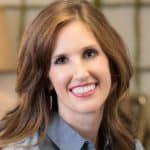
Lindsay Christensen is Chief Operating Officer of Parkridge, a pregnancy medical clinic located in Lubbock, Texas. Her duties include supervising staff and directing the clinic’s post-abortion recovery program. Lindsay is a licensed professional counselor, specializing in crisis counseling for pregnancy-related issues. She and her husband have three young children.

Your gift will equip pregnancy medical clinics across the country with ultrasound machines, resources, and nurses' sonography training so abortion-vulnerable mothers can see their babies .. and be moved to choose life. Every $60 you donate will help save the life of one preborn baby through our Option Ultrasound program.
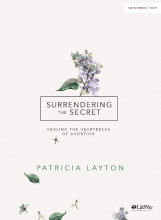
Author Pat Layton, founder and president of A Woman's Place Ministries, helps women find the path to healing through honest interactive Bible study, meaningful group experiences, and caring community.

Visit our online store and purchase a CD of today's program for yourself or to share with a friend.
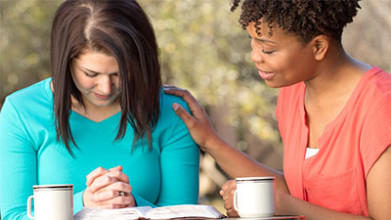
Focus on the Family offers a one-time complimentary consultation from a Christian perspective.

Are you struggling from the feelings of guilt and pain over a past abortion? Know that you're not alone, friend. We would count it a privilege to come alongside you on this journey of healing and forgiveness.
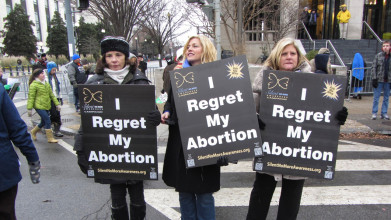
Whenever abortion issues make national news, some people rejoice and others are angry. But for those of us who have lost a child to abortion, just the mere mention of the word can trigger all sorts of emotions.
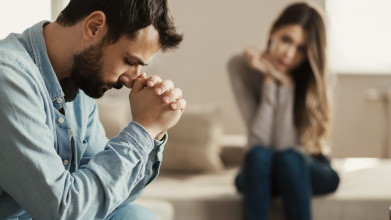
Keeping heartbreaking information from your spouse can cause even more pain. Here are several ways to deal with a past abortion in your marriage.
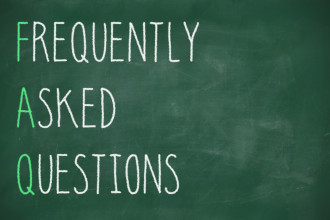
My friend's in emotionally bad shape over a past abortion, and I'd like to help her. But every time I try to broach the subject, she clams up. Do you have any insights into what she might be thinking?
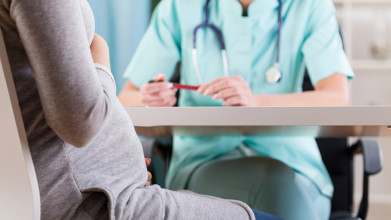
The emotional and practical support offered by pregnancy clinic staffers can have the biggest impact on abortion-minded women and their partners.

With 1 in 4 women making an abortion decision by the age of 49, the likelihood of us encountering someone post-abortive is very high.

Laurie Haynes shares a touching story about how a wife's prayers led to her husband's godly restoration from two past abortions.

Lindsay Christensen and Laurie Haynes comment on how we, as pro-life advocates, can respond to people who push for all limits on abortion to be removed.

Lindsay Christensen and Laurie Haynes talk about helping women find healing after their abortion – especially those who know in their head that God has forgiven them, but haven't truly experienced His restoration in their hearts.

Mary Beth Lagerborg, co-creator of Once-A-Month-Cooking, discusses the importance of hospitality and how families can prioritize dinner time by cooking a month’s worth of healthy meals in one session.

Scott Klusendorf, President of The Life Training Institute and Robyn Chambers, Vice President of Advocacy for Children at Focus on the Family, share strategies and encouragement in the pro-life movement. They offer compassion for abortion-minded women and speak up for pre-born babies. (Part 2 of 2)

Scott Klusendorf, President of The Life Training Institute and Robyn Chambers, Vice President of Advocacy for Children at Focus on the Family, share strategies and encouragement in the pro-life movement. They offer compassion for abortion-minded women and speak up for pre-born babies. (Part 1 of 2)

Larnelle Harris shares stories about how God redeemed the dysfunctional past of his parents, the many African-American teachers who sacrificed their time and energy to give young men like himself a better future, and how his faithfulness to godly principles gave him greater opportunities and career success than anything else.

Our guests share their dramatic stories of surviving the attempts to end their lives while in their mother’s womb, providing a stark and undeniable counter argument to pro-abortionists who argue that a fetus is not a living human being. (Part 1 of 2)

Our guests share their dramatic stories of surviving the attempts to end their lives while in their mother’s womb, providing a stark and undeniable counter argument to pro-abortionists who argue that a fetus is not a living human being. (Part 2 of 2)